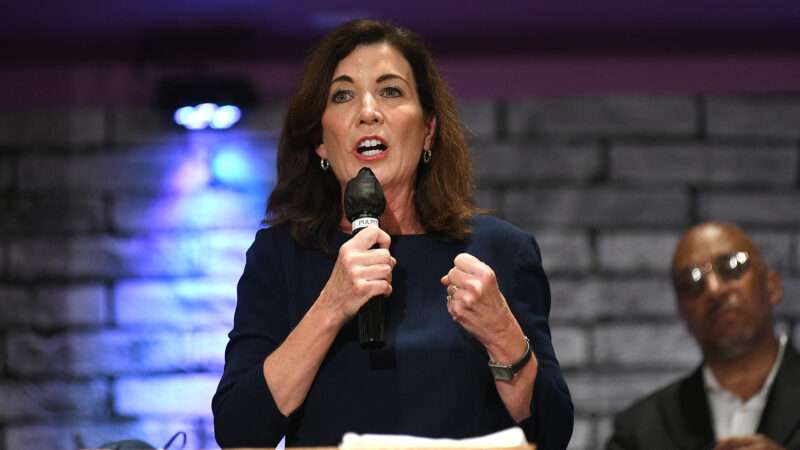
When a psychopath perpetrates a mass shooting, politicians often pick an industry, trend, or substance to blame for having caused the violence. Violent video games are a favorite target of both parties—Democratic senators pilloried them throughout the 1990s and early 00s, and former President Donald Trump went after them following the El Paso shooting in 2019—but so are psychiatric medications, Satanism, and of course, the Second Amendment.
On Saturday, 18-year-old Payton Gendron—a white nationalist conspiracy theorist, according to his online manifesto—traveled to a supermarket in a majority-black area in Buffalo, New York, and killed 11 people, most of them African American. Democratic New York Gov. Kathy Hochul has responded to the horrific violence in Buffalo over the weekend with a familiar invective against guns. But she is also pinning the blame on social media. In a Sunday interview with NBC News' Chuck Todd, she faulted online platforms for not doing more to police extremism.
"It's all induced by the internet," she said. "And the fact that platforms are willing to share this information, allow it to be posted, a manifesto that's been out there that describes in great detail how someone wants to have an execution of individuals in a community that's targeted because it's the highest black population within a geographic area, that's all out there. And also the fact that this can be livestreamed. How long was it livestreamed before someone paid attention?"
There is an answer to her question: two minutes.
"I hold them responsible for not monitoring and alerting law enforcement," she continued. "That's exactly the issue here, is that it is fomenting. People are sharing these ideas. They're sharing videos of other attacks. And they're all copycat. They all want to be the next great white hope that's going to inspire the next attack. We can't let that continue."
The fact of the matter is that social media companies routinely cooperate with law enforcement. All major platforms report suspected criminal activity, child exploitation, and violence to the FBI. To take just one example, in the run-up to the January 6, 2021, attack on the U.S. Capitol, both Facebook and Parler referred dozens of accounts to the feds.
"Parler had shared over 50 tips with the FBI warning of violence in advance of January 6, including one post, for example, that stated 'don't be surprised if we take the #capital building,'" according to a report by the Government Accountability Office, as noted by Just Security. "Facebook says it also sent the FBI information regarding potential violence at the Capitol on January 6."
Indeed, law enforcement had been warned about Gendron—not by a social media company, but by his school. Last spring, just before he graduated from high school, Gendron threatened to commit a murder-suicide, according to The New York Times. He was hospitalized, evaluated, and eventually released. The matter was referred to the state police, but Gendron "fell off investigators' radar."
These developments are eerily similar to the situation with Nikolas Cruz, who committed the mass shooting at Marjory Stoneman Douglas High School in Parkland, Florida. Cruz's erratic, violent behavior was noticed by his family, other students, and teachers. It was reported to school security guards, the local sheriff's office, and eventually the FBI. Law enforcement simply declined to take action to prevent a known psychopath from carrying out his attack.
The "see something, say something" ideology behind U.S. policing says that a well-informed and watchful citizenry is expected to actively monitor for threats and report them to law enforcement. When something goes wrong, the people are often blamed for having been inattentive—for missing the signs. But something close to the reverse is usually true: In the Parkland and Buffalo cases, civilians saw something and said something. Unfortunately, the feds didn't pay enough attention.
That is what's ultimately so frustrating about attempts by Hochul and other political figures to find someone else to blame: They are distracting from mistakes that government actors made, in service of an agenda that usually involves citizens surrendering more liberties.
In fact, with some goading from Todd—who declined to voice any potential downsides of giving the government a broader mandate to police speech—Hochul issued a fact-free condemnation of so-called hate speech.
"I'll protect the First Amendment any day of the week," said Hochul. "But you don't protect hate speech. You don't protect incendiary speech. You're not allowed to scream 'fire' in a crowded theater. There are limitations on speech."
There are limitations on speech; it's a shame that New York's governor doesn't know what they are. Some incendiary statements, if they rise to the level of true threats of violence, are illegal. Hate speech, though, is allowed under the First Amendment. The Supreme Court has never recognized hate speech as a separate category of expression that is exempt from protection. And the fire-in-a-crowded-theater reference is one of the most tortured, misunderstood analogies in the English language: It is absolutely permissible to scream "fire" in a crowded theater, especially if there is an actual fire.
The Buffalo shooting is not a cautionary tale about the dangers of unrestricted speech on the internet, but rather, a sobering wakeup call about how practically difficult it is for the police to prevent violence, even when warned about it. That New York police did not take this threat seriously enough should prompt self-reflection on the part of law enforcement, rather than sweeping condemnations of social media.
The post New York Gov. Kathy Hochul Blames the Buffalo Shooting on Social Media appeared first on Reason.com.







